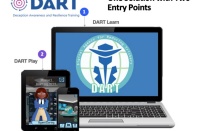Media Literacy in the Classroom and Beyond (11/3/23)

University at Buffalo's Center for Information Integrity partnered with the Education Collaborative of Western New York and the New Literacy Project (NLP) to bring Buffalo teachers a half day workshop on media literacy.
Participants were offered the opportunity to continue for a year-long certification program by CII and NLP.
Workshops
The News Literacy Project’s professional learning emphasizes teaching educators essential news literacy concepts they can integrate into the curriculum to provide their students with the abilities, knowledge and confidence to navigate an increasingly complex and ever-changing information landscape.
Teaching news literacy: where do I start? We’ll provide an overview of the news literacy concepts and skills that students need to be reliably informed, such as recognizing the difference between news and other type of information including opinion and propaganda, using the standards of quality journalism to identify credible news sources, identifying misinformation and using fact-checking and digital verification tools, and discerning various types and forms of bias.

Avoiding the Rabbit Hole: Teaching concepts in conspiratorial thinking: Conspiracy theories are becoming part of mainstream discourse and public awareness. From QAnon to pandemic-related beliefs to older ideas such as the Earth is flat, we are finding that more and more of our friends, family and loved ones believe at least one conspiracy theory. How do we teach students to avoid conspiracy theories without actually teaching them the specifics of such false beliefs? This session explores the psychological and cognitive factors behind conspiratorial thinking, including the role of fears and anxiety, cognitive dissonance and biases, motivated reasoning and institutional cynicism. We will discuss the ways in which conspiracy theories exploit our emotions as well as fill our emotional needs.





